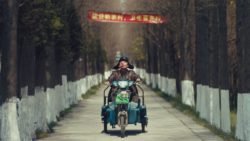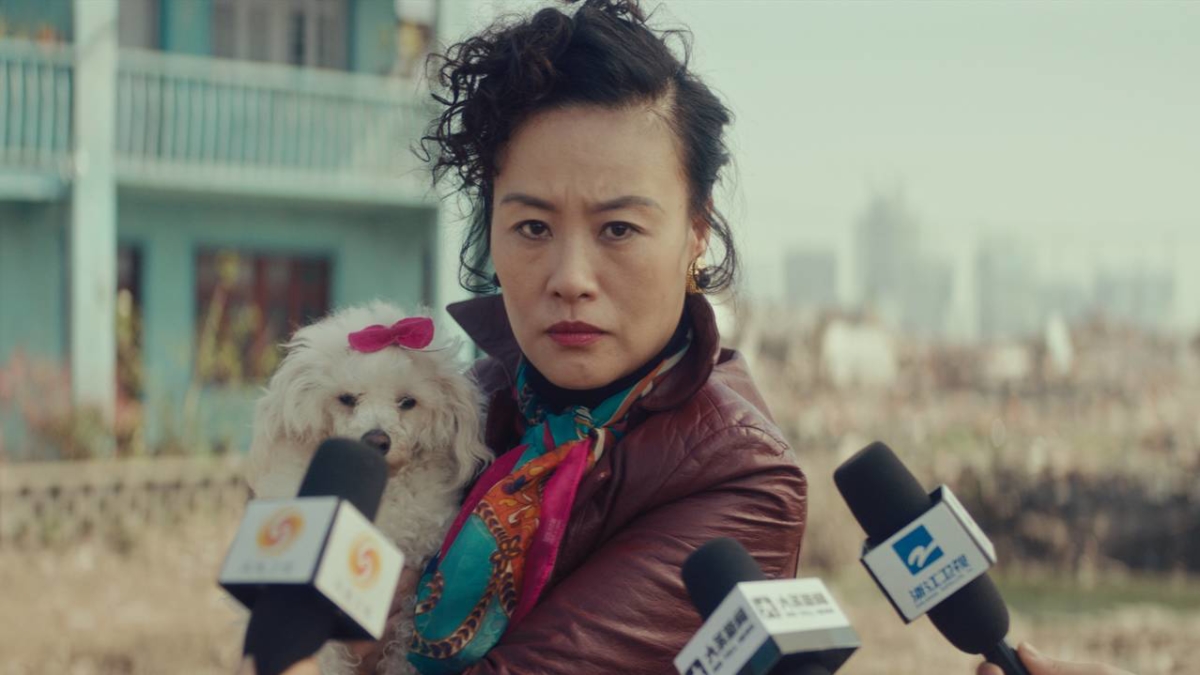DEAD PIGS is director Cathy Yan’s spiky, darkly humorous feature on modern China where five lives coalesce as thousands of dead pigs float down Shanghai’s waterways. Inspired by a news clipping about dead pigs suddenly surfacing in public bodies of water, Cathy takes this true story and molds it with other bits of China to form a contemporary portrait of a country in a relentless march toward progress. Questions of social responsibility, of what place the old still has in the present, and the fine line between reality and absurdity are animated by characters like Candy Wang (played by Vivian Wu), who stands off against major real estate developers while wearing bunny slippers and hair curlers. She occupies her house despite it being the last one standing in a village that has turned into a demolition ground. Or David, a white expat and architect in China who finds more lucrative opportunities by becoming a rent-a-model for businesses who want white faces for a cosmopolitan brand. He takes on gigs where he pretends to be a business mogul, snipping a red ribbon as a chorus of women dressed as caricatures of the global world sing, “It’s a mall world after all.” Her five characters are five tropes/ classes of people who live in China today, but Cathy approaches them with a deft touch that is clearly attentive to their individual humanity.
Full of karaoke scenes, anachronic images of a village of seniors gleefully playing with VR technology, and a camera that hungrily takes in the night lights and colors of China, DEAD PIGS is a smart satire that breathes with the earnestness and ease of a pop song. As a directorial debut that featured at Sundance, was executive produced by arthouse giant, Jia Zhangke, and the film that got Cathy Yan noticed by actor Margot Robbie and her next role as the director of the next Harley Quinn movie, DEAD PIGS is a stunning debut you don’t want to miss.
DEAD PIGS is screening on Saturday, 7/28 as AAIFF 18’s Centerpiece film. For more information and tickets, visit our Festival site.
In our conversation with Cathy Yan, we got to chat about her experiences as an outsider, how some people want to live in a virtual reality world in China, and how sometimes the only way to cope is to just laugh at the way things are. For audio of the full convo, visit here. Excerpts from the interview are below.

Ying Yu Situ: Candy Wang is an amazing anti-displacement icon and kinda who I want to be in 30 years. Was there any real life inspiration behind her character?
Cathy Yan: [laughs] Yeah, a little bit actually. The “nail house” is the type of home that she had, they’re called nail houses in China… I’ve always been fascinated by China, I was born in China and grew up and spent a lot of time there as a journalist and was a general academic about China. One of the first incidences of a nail house was in Chongqing back in like 2006 or 2007, and there’s a woman called Wu Ping who kind of became a bit of an inspiration for Candy. We even made an ode to her in the hair style, the crinkly hair, and she had a husband and the two of them just protected their old house in the middle of Chongqing. It’s really incredible, they created this entire construction ditch around their house and they became marooned in it essentially and they became this, as you said, icon. She really knew how to work the media and she had this fun, sassy personality and I sort of took that as an inspiration… that kind of like very sassy, Chinese woman that I feel like we often don’t see much in films, but especially any film that could make it in the West, so I also wanted to create that too. The women in my life, my mother, my grandmother, these are strong ass women. They’re not weak.

YYS: Yes, I love that—I mean that brings me to my larger question, why was telling this story with humor important to you? ‘Cause I think modern China can be really depressing. [laughs]
CY: Well I thought it was important because I find modern China also very funny. I mean there’s this interesting kitschiness to it, it’s very earnest, it’s very outlandish and broad in many ways. I’ve always felt there to be a lot of humor in China because things just made me chuckle because it was so absurd and I think there is this humor there, maybe they’re not even aware of it sometimes. I thought it was just how I saw the world.
YYS: Are there any specific examples for you or what was one of the first moments you noticed?
CY: When I spent a lot of time there, my friends and I had this sort of inside joke, we would say this thing which we took from BLOOD DIAMOND, that movie with Leo DiCaprio and they would say, “Yeah, T.I.A. This is Africa.” Obviously this is something very different, but we sort of co-opted that to say, “T.I.C. This is China,” whenever something kind of ridiculous would happen, things that are almost unfathomable… It tickled me to think that the most unrealistic thing in the film actually happened, which was the [dead] pigs and there’s so many incidences like that in China where this cannot be true, but it’s there and I think that element, that surreal absurdity of China is what I really wanted to capture. A lot of what’s in the film is inspired by things that are really happening there, everything from being able to hire and rent a white person as a model [laughs] to a really sort of darkly comic activity of running into cars for money. I mean that’s a real phenomenon too. I used to be a journalist so I very much wanted to bring all these stories that I heard about, that I wrote about, and that I saw, and tried to put it together into a movie.
Y: It’s kind of amazing that you said T.I.C. because when I was studying in Shanghai we also used that terminology in our group
C: [laughs] Oh really?
Y: Yeah, I don’t know who started it, but we were also like, “Oh haha, this is China, T.I.C.”
CY: Yeah maybe it went around, that’s funny [laughs] I felt like I don’t remember it coming from anyone that like— I had no idea. What a funny phenomenon then.
Y: So you have an interesting background because you grew up in many areas like Hong Kong, DC, went to school in New York, a very international diasporic background. How did that influence your making of the film? Do you think of this as an Asian American movie in any way or are there jokes that maybe an Asian American or a Western audience might read differently from a Chinese audience?
C: That’s a very interesting question and I feel like I’m still trying to wrap my head around it. I pretty much made a very personal movie to me, even though it’s not autobiographical. But to me it was very personal because it is China seen through my eyes, and is very much a product of my weird upbringing where I was an outsider in the US and I was an outsider in China and I was an outsider in Hong Kong, which has a very different culture from the Mainland. So I pretty much grew up my entire life as an outsider and I think that helped, probably led me to do what I do now, which I think is just being able to examine life and analyze it in a way, and then tell an interesting story, and that’s what I did as a journalist and still do as a filmmaker. I think in that way DEAD PIGS came about, and oddly it’s just this weird product of who I am.
It’s difficult for me to define myself, like I don’t know whether I’m fully American or fully Chinese and I’m not really Asian American in the very traditional sense. I was born in China and I spent a good amount of my life internationally so I’m kind of in this weird in-between person and so is this movie, cause it’s not like a local arthouse Chinese film and it never pretends to be or is. But it’s also not exactly an Asian American experience because that’s not what it portrays either. I think, again, somewhere in between.
Y: I think that itself is a very Asian American response.
C: [laughs] Mhm, and yeah I think just to add to that—what you said, it’s very true, as Asian Americans, as children of immigrants, we’re constantly in conversation with our past and some people try to ignore it and some people are fascinated by it, and I was fascinated by it. I mean even when I was a student at Princeton, I alluded to this earlier, but I knew about the Chongqing nail houses because I studied modern China in academia basically and my Princeton thesis was on it, I feel like I always have this strange fascination with my family history and I think a lot of immigrants have that.

Y: Yeah, yeah. It’s not quite a liminal space, but I think something I really responded to in the film was even the music that you used or that very nostalgic pop song which I know through my parents, really.
C: Right, right, totally, I mean that absolutely was the same for me. My mom and I would sing to Teresa Teng in the car and karaoke to it and it is a very profoundly Asian or [rather] Chinese American experience that I learned, which is funny because in some ways, it can be very isolating to be an immigrant because you’re not fully American. And I was an only child so I think part of what’s been really fun and comforting in having people see the film is that they’re like, wow I know Teresa Teng because my parents would sing that. I think it’s very popular in China, but it’s also very popular with our parents’ generation here, so I think in a weird way that has transcended borders.
Y: Absolutely… you said DEAD PIGS doesn’t quite fit into arthouse or Asian American cinema, I was surprised to see Jia Zhangke in the credits. What was it like to work with him or what did he think about the direction of your film? His movies tend to be a lot heavier; they carry less of the bounciness that I think your movie has, which was awesome.
C: Thank you. Yeah, I think we overlap a lot in terms of themes and you know he’s been such a disciplined journalist, I think, of China and he’s gone there with films in a way I haven’t seen in other filmmakers. He’s really doing what I try to aspire to do as well, thematically and subject matter wise, but we definitely have a different style and he was incredibly supportive of that. I don’t think he’s trying to just support people who’s making work just like him, it’s not fun. [laughs]
Y: I’m curious also about your process in making your first feature. What was it like to see the whole thing come together? How was it?
C: [emphasis] Pretty wild. You need a lot of luck and a lot of balls I think to get your first feature done. It was three years in the making. I made the script my final year of film school and it just takes a long time to get anyone to trust you enough to make it… it was a huge risk in every possible way, not just for me but pretty much anyone involved in the movie. None of us got paid particularly well, everyone worked so, so hard on it, it was something that I’m still kind of amazed we pulled off and incredibly proud we did. To tell anyone that we’re going to make this kind of film in China, get a censorship approval in China, and shoot a woman in a pink bathrobe on top of a rooftop with a bulldozer coming at her, and pay the extras, and do it in rain, and you know, it’s petty crazy and it certainly was not a small, intimate film by any stretch of imagination, so yeah I’m very proud of it and that we were able to do it and it was because we had an incredible team.
Y: Production value is—I mean, it’s just a beautiful film to look at.
C: Thank you, thank you. My DP was wonderful too, Federico Cesca.
Y: Who are some of your influences in film or in this film?
C: I’ve always been a big fan of Paul Thomas Anderson, the Coen Brothers, Robert Altman. I think you probably can see that in the film, that tone you’re kind of talking about, humorous but dramatic at the same time… I think they’re all humanist at heart, they’re all trying to figure people out and they always have really fun characters and fun worlds and just great, great filmmaking.
Y: What are you most excited to work on next? What is your artistic touch and what are the kinds of things you want to make? I’m sure DEAD PIGS was one of them.
C: It keeps changing a little bit, I think for me I never want to make the same thing again. DEAD PIGS was a challenge as a first feature. It was in a country I don’t really call home. I know the language and I tend to speak Chinese, but it was still one step removed and I put myself out of my comfort zone consistently through the entire making of the movie, everything from like having to speak only Chinese to my actors was challenging sometimes. Unless it’s like your first language—and Chinese is not anymore—there’s always that little bit of a hiccup. You’re trying to express yourself in the most profound ways, but sometimes you resort to third grade language [laughs] but I actually found that to be kind of freeing in a weird way. There’s so many challenges in DEAD PIGS that I don’t think I’m just going to be like “Alright, I’m just going to make a really easy movie next.” I’m always looking to do something different, to do something that’s really exciting and new and challenging.
Y: Last question, did you find the ending to be a “happy” one or is that category even relevant?
C: Yeah I don’t know why there’s such a sort of focus on the ending, it’s kind of funny to me, I don’t think of it as happy, it’s open to interpretation. It’s very bittersweet… I don’t think everyone gets what they want, people get some things but lose out on others… I think it’s more complicated than saying it’s a “happy” ending… I think if there ever was sort of a lesson in it all, the river keeps flowing, the pigs are clean, and the river is clean of pigs, and then something else comes along and I think at the end of the day we all just kind of have to make do with certain things outside of our control so, I think for me—it’s not like, “Tada, happy ending.” At this point what can you do except control what you can and be there for each other?
Y: I mean bittersweet is an interesting word, it’s kind of a trope to use for a lot of [first-generation] Chinese Americans, it’s always a bittersweet thing, not a sweet thing.
C: Yeah, definitely, I think DEAD PIGS has that sort of duality to it or complexity or however you wanna call it, but you can’t say that it’s a drama nor can you say it’s a straight comedy and sometimes you’re laughing, but you’re laughing kind of inappropriately or sometimes you might feel you wanna cry, but then the next moment you’re laughing again. I think this whole movie, we’re kind of always teetering on the edge of that. And it’s not like such a straight emotion that we’re trying to evoke, if you will.
Y: Where do you consider home since you don’t see China as home?
C: I would consider New York as home, I’ve been here for a decade now and I think it’s always been the home for the homeless.
 Excerpt and interview written by Ying Yu Situ, Editorial Coordinator at Asian CineVision
Excerpt and interview written by Ying Yu Situ, Editorial Coordinator at Asian CineVision

